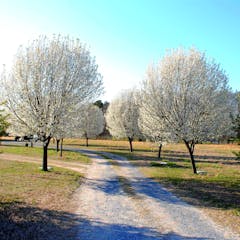
Articles on Herbicides
Displaying 1 - 20 of 34 articles

New research provides evidence for the first time that the primary chemical in Roundup is reaching people in nearby homes, and it isn’t just from the food they eat.

Your less manicured garden has the potential to combat tackle climate change and help wildlife survive.

Some boreal plant species are classified — and treated — as weeds, affecting Indigenous communities’ access to important cultural, medicinal and ceremonial resources.

It’s a plant that is nearly impossible to obliterate, but new research reveals the best way of tackling Japanese knotweed in the most sustainable way.

They’re beautiful in bloom, but Callery pear trees crowd out native plants and turn productive open land into woody thickets.

Published in 1962, ‘Silent Spring’ called attention to collateral damage from widespread use of synthetic pesticides. Many problems the book anticipated persist today in new forms.

The herbicide revolution reduces the availability of edible weeds, which may undermine food and nutrition security.

Farmers are stuck in a chemical war against weeds, which have developed resistance to many widely used herbicides. Seed companies’ answer – using more varied herbicides – is causing new problems.

People are exposed to toxic substances – like pesticides, chemicals in plastics and radiation – every day. A growing body of research shows that this exposure is causing a decline in male fertility.

Roundup may be taking a beating in the US, where three juries have concluded that it gave plaintiffs cancer, but it’s still widely used around the globe.

Paraquat’s potentially lethal effects on humans are well known. But our research has found it also causes serious environmental damage.

Planting a garden for winter-active insects is a wonderful way to support local biodiversity. Your garden will thrive with the free pollination and pest control services the insects provide.

It’s unlikely that all species of bees will go extinct anytime soon – but current losses could still have a terrible impact on food supplies and ecosystems.

Wildflowers, bees and butterflies – your lawn is a vibrant ecosystem waiting to be unleashed.

Weeds are serious problems on sports fields, parks and other sites covered with turfgrass. A new strategy uses mechanical force to kill them instead of chemical herbicides.

Most studies on the use of pesticides are funded by those that produce the chemicals but only independent research can inform us about the best agricultural practices.

What is proof? In both law and science, it’s basically a consensus of experts – but they work at very different speeds. That means juries may reach verdicts on an issue before the science is settled.

Possible causes of limb malformations in babies born in rural areas of France.

Research shows that managed honey bees may pose a threat to free roaming honey bee populations.

The world’s most widely used herbicide poses a threat to honey bees.
